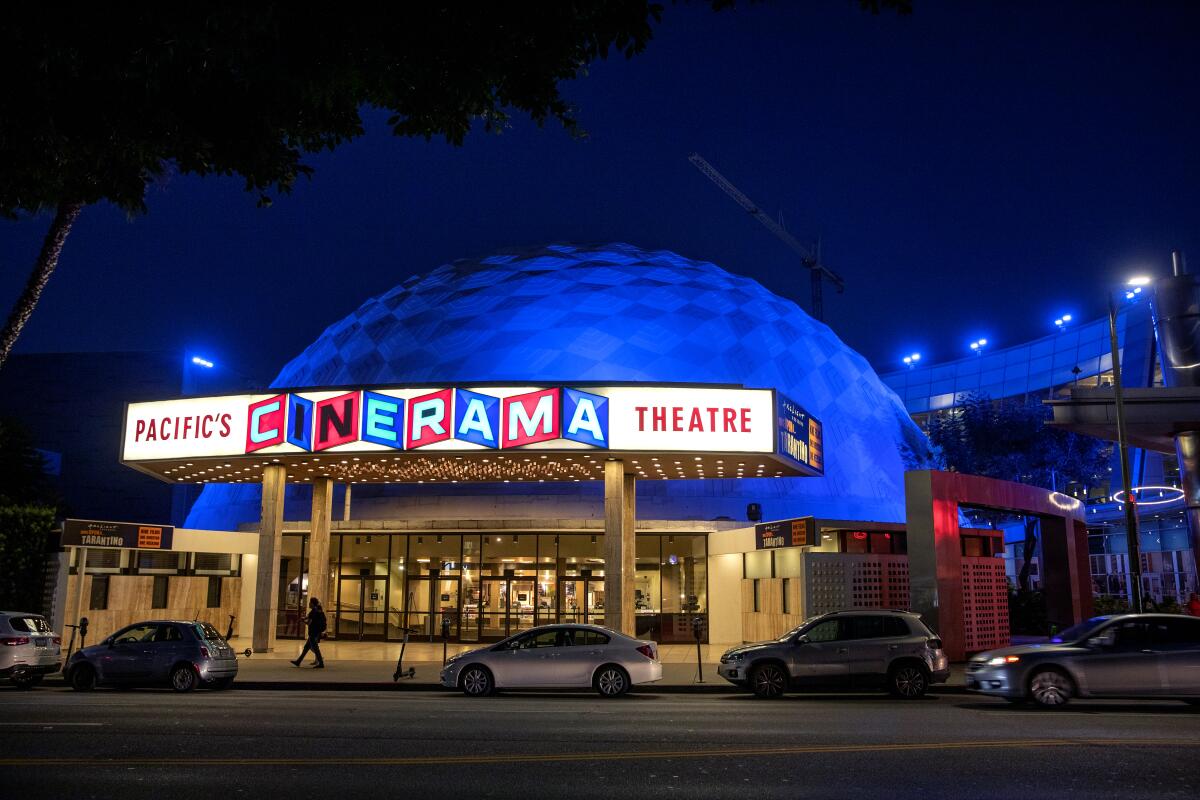AMC and Regal close all U.S. theaters amid coronavirus crisis

- Share via
Movie theater chains are reeling from the coronavirus pandemic after city officials in Los Angeles and New York over the weekend ordered cinemas and other venues to close and box office receipts sank to historic lows.
Shares of AMC Entertainment, owner of the nation’s largest chain, plummeted 19%, or 62 cents, to $2.60 in Monday trading. Cinemark Holdings’ stock dropped 31% to $10.13, while Imax fell 18% to $9.15. The markets plunged broadly due to worries about the crisis’ effect on business, triggering a temporary halt of trading on Wall Street.
Mayor Eric Garcetti in a Sunday night video news conference said movie theaters in Los Angeles must close to help slow the spread of the virus.
The closures, which also affect bowling alleys, bars, nightclubs, gyms and fitness centers, went into effect at midnight and run through March 31. Restaurants are closed for dine-in business but can stay open for take-out and delivery, Garcetti said.
“I want to stress that I have not taken these steps lightly,” Garcetti said. “To some, it may feel wrong. But I would say it’s exactly when things feel wrong that it’s the right time to do them, and when things feel right, it’s too late.”
Regal Cinemas, owned by British exhibitor Cineworld, said it would close all its locations indefinitely, starting Tuesday. Knoxville, Tenn.-based Regal operates 542 theaters accounting for 7,155 screens, making it one of the nation’s largest circuits.
“At this time, we have made the difficult decision to close our theaters,” said Cineworld CEO Mooky Greidinger. “We value our movie-loving customers and have no doubt we will be serving them again as soon as possible.”
AMC Theatres said it would close all of its U.S. locations, starting Tuesday, for six to 12 weeks in response to the pandemic after President Trump declared that people should avoid gatherings of more than 10 people.
AMC previously said it would limit attendance to 50 guests for all its showtimes, after earlier reducing seating to 50% of each of its auditoriums. The company was trying to comply with CDC recommendations limiting gatherings to a maximum of 50.
But the new guidance from federal authorities made the continued operation of cinemas impossible, AMC said. The Leawood, Kan.-based exhibitor has about 630 theaters in the U.S.
“We are ever so disappointed for our moviegoing guests and for our employee teams,” said AMC Chief Executive Adam Aron. “Still, the health and wellbeing of AMC guests and employees, and of all Americans, takes precedence above all else. We will continue to monitor this situation very closely.”
The movie theater closures come at a fragile time for the theatrical film business, which was under pressure from changes in moviegoer habits even before the spread of COVID-19. Studio distribution executives, who were not authorized to comment, said the situation was fluid and it was not clear yet how many U.S. theaters were shuttered or how much it would affect business.
The impact, however, is sure to be devastating, at least in the short term. Theaters have already started feeling the pain as many nervous patrons stay home.
On Monday, Universal Pictures took an extraordinary step, saying it will make its movies available in the home on the same day as their global theatrical releases, a radical departure from past practice of waiting about 90 days before films are released for home viewing.
Theaters have long resisted collapsing the so-called theatrical window, fearing it would undermine their business by discouraging consumers from going to the multiplex.
But the coronavirus pandemic has forced studios to reconsider their strategy for distributing movies.
“Rather than delaying these films or releasing them into a challenged distribution landscape, we wanted to provide an option for people to view these titles in the home that is both accessible and affordable,” said NBCUniversal Chief Executive Jeff Shell.
Ticket sales in the U.S. and Canada were $55.3 million for all films Friday through Sunday, marking the weakest box office weekend in more than 20 years. Ticket sales for Pixar’s “Onward,” the biggest movie at the box office currently, plummeted 73% in its second weekend, an especially steep drop for a Disney family film.
All three major new releases — Lionsgate’s faith-based film “I Still Believe,” Sony Pictures’ Vin Diesel movie “Bloodshot” and Universal Pictures thriller “The Hunt” — opened with less than $10 million, and all did worse than analysts expected.
So far this year, domestic ticket sales are down 9% compared with the same stretch of time in 2019. Wedbush Securities analyst Michael Pachter estimated that total domestic box office this year would be down more than 12% from 2019. The declines in attendance will make it more difficult for companies such as AMC to reduce their debt, Pachter said.
“We are now genuinely concerned,” Pachter wrote in a research report for clients. “There is valid concern that COVID-19 will limit theatrical attendance globally, whether driven by theater closures, capacity limitations, or fear of contamination. ... If theater closures persist beyond June, some exhibitors will face pressure to meet debt service.”
Closed theaters in Los Angeles include ArcLight Hollywood, Regal L.A. Live, the Landmark, TCL Chinese Theatre, Pacific Theatres at the Grove, Alamo Drafthouse Cinema Downtown Los Angeles and AMC’s Universal City Walk, Woodland Hills, Century City, Marina Del Rey and West Hollywood locations. Laemmle Theatres has shuttered all of its Los Angeles County locations.
Some major Los Angeles area theaters, including AMC’s flagship Burbank multiplex and the Pacific Theatres in Glendale, were still accepting patrons as of Monday morning, according to the theaters’ webpages.
Los Angeles County then adopted restrictions on movie theaters, bars and gyms, similar to Garcetti’s order. The county’s public health department director, Barbara Ferrer, also announced 25 new confirmed cases of COVID-19, bringing the county’s total to 94.
Movie houses in New York City, Massachusetts and Quebec have also shuttered, and studios and exhibitors are bracing for additional closures.
Derek Sherry, 23, has been working part-time at Showcase Cinema De Lux in Farmingdale, N.Y., for the last three months at the multiplex concession stand to make his student loan payments while he lives with his grandparents. Monday is set to be his last shift for the foreseeable future as the theater shutters.
“I wasn’t making a whole lot of money to begin with,” said Sherry, an aspiring actor and writer. “But it’s still money I could’ve used I pay my $250-a-month in student loans, so everything really helps. ... It’s going to be really tough.”
Sherry said, however, that he agreed with the decision to shut down venues, despite the hardship it will surely cause part-time workers. At a weekend showing of “Bloodshot,” he said, there were 90 people in one auditorium.
“People should take a step back and think about what’s more important than seeing the latest Vin Diesel movie,” he said. “Unfortunately, I’m going to take a financial hit. On the other hand, what happens if I am working and I bring back the virus to my grandparents, one of whom is already immunocompromised?”
Theaters that remain open have dramatically limited their capacity to comply with recommendations on social distancing from the Centers for Disease Control and Prevention.
Dallas-based dine-in exhibitor Studio Movie Grill also reduced seating availability for its theaters, including the location it opened in Glendale last year. Guests will be 10 feet apart, with a maximum of 50 attendees in all its auditoriums, the company said.
“Immediate action is now required,” said Studio Movie Grill founder and CEO Brian Schultz. “We are all taking precautions to support a healthy future for everyone for the long term.”
More to Read
Inside the business of entertainment
The Wide Shot brings you news, analysis and insights on everything from streaming wars to production — and what it all means for the future.
You may occasionally receive promotional content from the Los Angeles Times.











